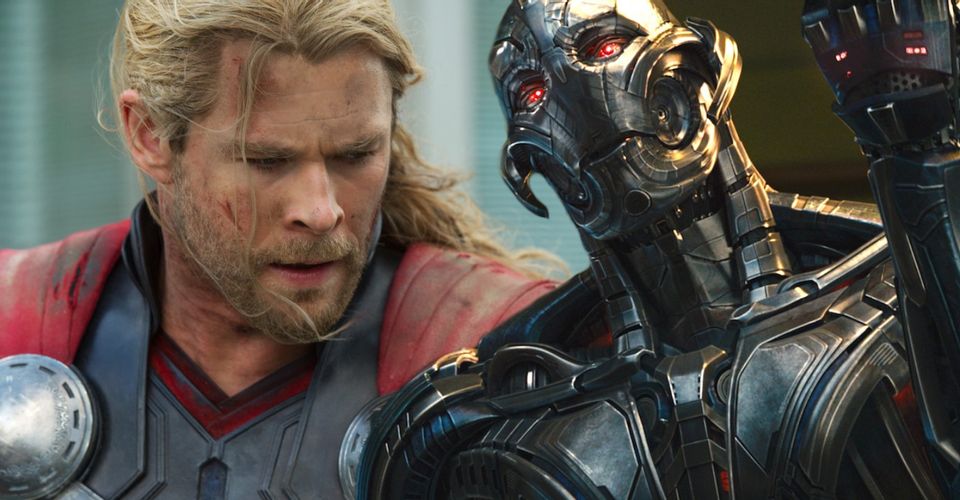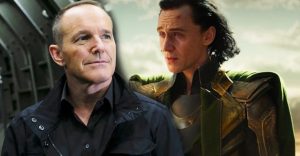Age Of Ultron: Thor Should Have Died (How The MCU Set It Up)

Here’s why the MCU’s Thor could, and perhaps should, have been killed off in Avengers: Age of Ultron. While the MCU’s immediate future appears to be on Disney+, the superhero franchise remains a box office juggernaut in both a critical and commercial sense. A major factor in that success is Chris Hemsworth, who has portrayed the Asgardian since 2011. The role has made both the actor and Thor himself household names across the world, and the God of Thunder remains a key component of the MCU’s narrative even heading into Phase 4.
After his solo movie debut a decade ago, Thor joined the Avengers in Marvel’s hugely successful 2012 crossover, rallying the other heroes against his own brother. Hemsworth returned a year later for Thor: The Dark World (and immediately wished he hadn’t), and then joined his pals for another team-up, this time against Ultron. Since then, Thor has battled Thanos in two further Avengers installments and undergone a makeover at the hands of Taika Waititi, with Thor: Love & Thunder currently set for 2022.
Despite being ever-present in the MCU so far, Thor’s demise could’ve come far earlier – in Avengers: Age of Ultron. Not only did the MCU seem to be building towards an epic sacrifice for the Asgardian, but dying in Sokovia completes Thor’s journey up to Joss Whedon’s 2015 sequel. The downside to this early exit is, of course, missing out on Thor: Ragnarok and some great moments in Avengers: Infinity War, but Thor’s death might’ve drastically improved the MCU’s weakest team-up.
Quicksilver’s Death Was Never High Enough Stakes

When the Avengers get together in the MCU, it’s vital that the stakes are raised. Something really bad must happen to justify the world’s strongest superheroes coming together, and also to elevate the crossover above a standard solo movie. Avengers movies are generally very good at this, with Agent Coulson’s death acting as a catalyst for assembling the Avengers in 2012, and the decimation of the Asgardians punctuating the arrival of Thanos in Avengers: Infinity War. By contrast, Avengers: Age of Ultron‘s most significant death is Aaron Taylor-Johnson’s Quicksilver, who is introduced only a couple of hours before his death scene.
Avengers: Age of Ultron falls flat in numerous areas, but failing to sufficiently raise the stakes is one of the film’s biggest cinematic sins. Audiences aren’t sufficiently acquainted with Quicksilver for his death to truly matter, and the moment is more about building Hawkeye and Scarlet Witch than adding gravity to the fight against Ultron. The consequences of the final battle in Sokovia are dealt with more in subsequent films (the Sokovia Accords, for example) than in Avengers: Age of Ultron itself, and the third act feels somewhat hollow as a result. Kevin Feige admits that Quicksilver’s painful end was designed to add stakes to the film’s ending (via MTV), but when Avengers movies rely so heavily on raising the bar compared to regular solo efforts, killing a brand new character simply isn’t enough.
Enter Thor. As one of the original Avengers team, and carrying two solo movies under his belt, Thor’s death would elevate the final battle against Ultron considerably, and a chapter of the MCU that has so often been forgotten would pack far more emotional punch. Killing off Thor obviously wouldn’t fix every issue with Avengers: Age of Ultron, but would at least deliver the kind of memorable climactic tragedy Quicksilver’s death didn’t. Ultron would then feel closer to Loki and Thanos in terms of his villainous impact on the MCU.
Thor’s Sacrifice Made Sense For His Arc

Thor making the ultimate sacrifice in Avengers: Age of Ultron doesn’t only improve the film, but also makes sense in the context of his pre-Ragnarok narrative arc. When Thor landed in the MCU, he was stripped of Mjolnir and deemed unworthy, forced to learn some humility before being allowed to reclaim his birthright. The entire solo movie is a teaching moment for Odin’s son, and when The Avengers begins, the God of Thunder is a far more grounded individual, protecting Earth and fighting alongside the human Avengers. However, Thor’s sense of superiority still glimpses through. Loki’s staff pushes him to refer to humans as “petty and tiny” and even when not under the influence, Thor plays the “I’m a god and you’re not” card once too often.
Since Thor’s character arc in the early 2010s was all about learning to become more humble, so his natural conclusion would be sacrificing himself for humanity’s sake. Instead of the Avengers fighting off the army of Ultrons as a team, perhaps Thor tackles them alone, allowing his allies to regroup and reinvigorating the Avengers’ cause with a noble death. Or maybe Thor is the only Avenger powerful enough to defeat Ultron, but must give his life in the process. This kind of sacrifice would finally prove that Thor has shaken off the unworthiness of yore, and learned to view mortal folk as equals. It’s also worth remembering that Hemsworth’s character had stagnated after the malaise of Thor: The Dark World. Dying in Avengers: Age of Ultron would’ve afforded Thor a fitting end after losing his way.
One of the most confusing moments in Avengers: Age of Ultron sees Chris Hemsworth fulfill his contractual obligation to appear topless and take a dip in a cave pool. While the theatrical version of this scene makes little sense, the full, unedited sequence includes Thor communing with the Fates of Norse mythology, which better explains his decision to bring Tony Stark’s Vision to life. But the ambiguity of Thor’s cave vision could’ve played perfectly into his death. During the sequence, Thor might’ve learned that sacrificing himself was the only way to save Earth from Ultron, effectively sealing his fate for the third act, and bringing meaning to Avengers: Age of Ultron‘s oddest scene.
Age Of Ultron Was About Superiority

The hypothetical death of Thor would appease the central theme of superiority at the heart of Avengers: Age of Ultron. Tony Stark, in his infinite hubris, develops Ultron to protect the Earth, but the AI cyborg quickly develops a superiority complex. Following in the long tradition of evil movie computer programs, Ultron decides the best way to save humanity is wiping the slate clean and starting anew with himself as ruler. Ultron views mankind as a lesser species compared to his metallic self, but this stance is countered by the introduction of Vision, an even more superior robot that chooses to see the best in his fleshy creators. In Ultron’s final moments, he and Vision wax philosophical over whether humanity should be given a chance to correct its mistakes, but this same dynamic could’ve played out between Ultron and Thor instead.
Like Ultron and Vision, Thor is naturally more powerful than any mere mortal, and generally considered a higher species than the citizens of Earth. But where Ultron chooses to wield that superiority against mankind and bend them to his own will, Thor has learned to use his power to protect the mortal realm. Ultron believes his strength gives him the right to end humanity, but Thor proves that the mighty should protect the weak, not lord over them. Positioning Thor as the counterpoint to Ultron instead of Vision carries more weight, as viewers have spent far longer with the character than Paul Bettany’s newborn android, and have a greater understanding of his motivations.
Thor Now Has No “Exit Strategy” From The MCU

Had Thor died in Avengers: Age of Ultron, his arc would’ve felt complete, but Chris Hemsworth continued in the role and this decision has been justified by the God of Thunder’s successful revitalization in Thor: Ragnarok and beyond. Plenty of MCU fans are now looking forward to the next chapter in 2022 with Thor: Love & Thunder but despite that excitement, Thor’s MCU story no longer has an obvious end point. After surviving Loki’s betrayal, Asgard’s destruction, Thanos’ snap, and pesky online gamers, there’s no thematic reason for Thor to die in the immediate future, nor any home for him to go back to peacefully. Valkyrie has taken over leadership of the remaining Asgardians, and the Avengers don’t have a mission on the horizon in Phase 4.
Instead, Thor’s upcoming stories find him larking about with the Guardians of the Galaxy and reuniting with a cancer-stricken Jane Foster, who will transform into the Mighty Thor. Neither narrative works as a satisfying conclusion, especially compared compared to Thor’s fellow Avengers, Tony Stark and Steve Rogers. Avengers: Endgame brought Iron Man and Captain America’s arc to a natural, emotional end, with Stark giving his life for the universe and Rogers living happy ever after (or before) with Peggy Carter. Having missed the boat with Avengers: Age of Ultron, it’s difficult to see how Thor can have a similarly resonant ending. Neither settling down with Jane Foster, nor jetting off with Star Lord’s gang draws a definitive line under Thor’s MCU story, while becoming unworthy in Thor: Love & Thunder would only set up a bigger redemption further down the line.
- Black Widow (2021)Release date: Jul 09, 2021
- Shang-Chi and the Legend of the Ten Rings (2021)Release date: Sep 03, 2021
- Eternals (2021)Release date: Nov 05, 2021
- Doctor Strange in the Multiverse of Madness (2022)Release date: May 06, 2022
- Thor: Love and Thunder (2022)Release date: Jul 08, 2022
- Black Panther: Wakanda Forever/Black Panther 2 (2022)Release date: Nov 11, 2022
- The Marvels/Captain Marvel 2 (2023)Release date: Feb 17, 2023
About The Author

















